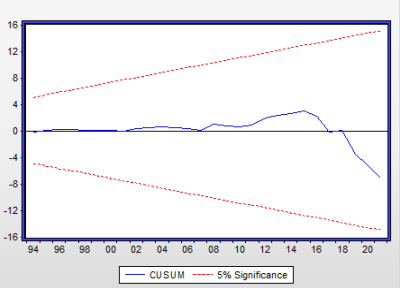Empirical Study of the Relationship between Capital Formation and Saving in Rwanda: An Econometric Approach
International Journal of Emerging Trends in Science and Technology,
,
4 January 2024
,
Page 8043-8054
https://doi.org/10.18535/ijetst/v2024.01
Abstract
The objective of this study was to investigate the empirical relationship between capital formation and saving in the case of Rwanda. The empirical literature review reveals that saving has a positive effect on capital formation. Results of the research obtained using the Ordinary Least Square method show that in Rwanda there is positive correlation between capital formation and saving. Saving is used to finance investments useful for the development of the country.
In the equation formulated, endogenous variable was capital formation while exogenous variables were saving, foreign direct investments and money supply. It has been demonstrated that coefficient of saving is positive. In Rwanda, an increase 1% of saving ends at an increase of gross capital formation of 1.271241%. Analyses done end at results that estimated coefficients are statistically significant at 5% margin of error i.e. 95% level of confidence. The relative probability for LSAV is less than 0.5. R-squared is 0.980003. This goes to mean that exogenous variables selected explain Gross Capital Formation at 98% and the model if fitted. Therefore, the government of Rwanda should make supplementary effort to encourage saving in the country so to boost the economy through more investment in order to meet its major objective, i.e the economic and social development.

How to Cite
Download Citation
References
- Article Viewed: 142 Total Download




